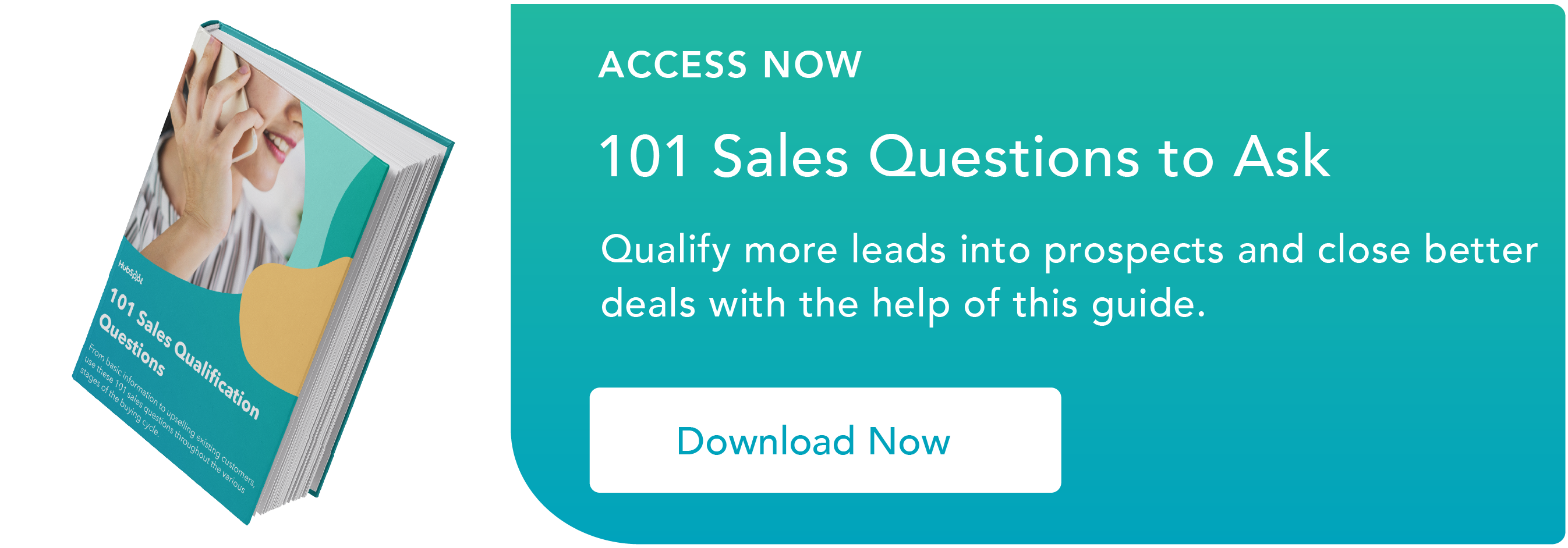Questions are the key to sales. From the first insightful question that makes a prospect think, "This person might have something to offer me," to the ones that get a prospect to realize, "We need what this company has," to when you finally hit pay dirt and prospects say, "Yes! We are ready to solve this problem once and for all," questions are what drive a sales process forward.

Unfortunately, most people hesitate to ask the tough questions that challenge a prospect to think critically and differently about their situation and help a prospect visualize a better outcome or a surer path to their end goal. Why? Because these same questions challenge the status quo, piss off change-resistant influencers, and potentially offend decision makers.
In addition to being unsure how to ask the question, many salespeople suffer from what Dave Kurlan has dubbed a "need for approval." But it's not their prospects' feelings they care about. Salespeople don't ask difficult questions because they're afraid to lose the deal. They choose ignorance not because of their kindness and concern, but because of their fear and selfishness.
Okay. Hopefully I've made you feel guilty now. (See? You're already reaping the benefits of me suppressing my need for approval.) Are you ready to do the right thing for your prospect -- which just so happens to also be the right thing for you?
How I Learned to Ask Tough Questions
I first learned about the "need for approval" as one of many sales weakness when I hired Rick Roberge as a sales coach.
My objective management group sales assessment showed that I had a slight need for approval. I was afraid of rocking the boat with prospects, and believed they needed to like me to hire me. I'm not suggesting that people will do business with salespeople who they don't like. But we don't actually need our prospects to like us -- as much as we need them to respect us. And when establishing respect is in opposition to maintaining your likeability, you must risk sacrificing likeability.
When business relationships begin, they are often full of pleasantries. Prospects usually start conversations about things that are safe for them to share. They'll use positive words and are more comfortable talking about strengths and goals.
But to really get to the heart of why a prospect needs (or doesn't need) your solution, you need to get past the niceties and identify their priority issues. Salespeople must ask the questions that get prospects to open up about areas of concern, frustrating challenges, and personal consequences of inaction.
Over a year or so of coaching, Rick helped me overcome my need for approval. He taught me multiple things I could do when it felt risky to ask the tough questions. One of the most effective things he taught me is a simple question that allowed me to get permission from a prospect to ask the question. This lesson has served me well over the years -- you can learn to use it below.
I might have gotten over my need for approval a bit too well, actually. Years later, I remember a conversation with HubSpot CEO Brian Halligan where he said, "The problem with you is that you don't really care what other people think of you."
The truth is, I do care -- deeply. But when people hide the truth or stand in the way of achieving an important goal, I am willing to risk being liked. Too many people are afraid to risk their jobs or relationships to ask the tough questions, call out their peers, or challenge their boss's point of view, and that's understandable.
But a salesperson has less to lose: A deal instead of a job. Salespeople who ask tough questions of prospects, especially when those prospects are decision makers, usually earn respect and ultimately more business.
How Asking Tough Questions Uncovers a Prospect’s Compelling Reasons to Buy
Another one of Roberge's students, Carole Mahoney, became an independent sales and marketing consultant herself a few years ago. At her firm Unbound Growth, she is passing along Roberge's approach to her students.
One of her students, Michael Douglas, recently published an article explaining how he finally got over his need for approval and how that benefited him and his client.
In a meeting Douglas recently had, with his boss along as an observer, he learned the value of risking likeability to earn respect. Here's a transcript of the meeting:
MD: Alright, so we have this list of agenda items that you provided before the meeting. Where would you like to start?
Prospect: Let’s start here. [Points to the first item.]
MD: Okay, why do we want to start here?
Prospect: [Chuckling] Well, I guess because it’s first on the list.
MD: Is it the most important?
Prospect: Well, it’s all important.
MD: Okay, so help me out here. If you were to rank this in terms of value -- low, medium or high -- where would it fall?
Prospect: I don’t know. Probably low to medium.
MD: [After a pretty long pause.] You don’t know me very well. But if you decide you want to know me better after today, you will learn I am a very transparent guy. I have a question, but I am afraid to cross the line. If I ask it, and you think I crossed the line, will you tell me?
Prospect: [Looking at Michael with a puzzled look] Well, I am a transparent guy too so yeah, I’ll tell you. What’s your question?
MD: You don’t seem like the type of guy that flies by the seat of his pants. You have two hours scheduled with us today. You have brought in your team. Why would you commit that kind of time and resources to something that is a low to medium priority?
Prospect: [Looks down thoughtfully at the list]. Well, the first agenda is a medium to low for me, but a medium to high for my team. But the third one on this list is my highest priority right now. Our CEO is on me to fix that.
Don't think you could pull that off? Did you feel your stomach wrenching as Douglas persisted even after the prospect resisted answering his question the third time he asked it? How about the fourth time? Nerves and all, I bet you can do it too.
And I bet you'll have the same result. If you need further encouragement, keep in mind that there were two senior executives in the room, and the company has $22B in annual revenue. The executive Douglas was challenging has a direct line to the CEO. If he can persist in this situation, so can you.
How to Get Permission to Ask Tough Questions
As demonstrated by the transcript of Douglas' meeting, the key to asking a tough question or challenging a prospect on something is to get permission first. There's multiple ways to ask for permission, but the best way to preface it is warn them of your intent and ask them if it's okay to proceed. Here's another way that you can more generally set up the tough question:
You: There's something I feel I should ask you. I think it's in your best interest for me to ask it. But I'm worried that it will upset you. [Pause here.]
Prospect: What is it?
You: I think this question is important. I won’t be able to help you effectively if I don't ask it. But I'm worried that you'll be upset. If I ask it, will you promise not to be upset?
Prospect: I don't know if I can promise that, but I'm pretty tough.
You: Will you at least tell me if I upset you?
Prospect: Yes. I can promise that.
You: [Ask your question.]
You can even do a head fake and suggest that you’re not going to ask them:
You: Oh. You know what. Nevermind. Let’s keep going.
Prospect: No. What’s your question?
You: Can you promise you won’t get mad?
Prospect: Yes. Fine, I promise.
You: Okay. [Ask your question.]
Bonus: How to Ask Forgiveness When You Do Upset a Prospect
Some of you are thinking, "I still can't do that." If you still think you’ll crash and burn, prepare yourself to ask for forgiveness too. Here's an example of what that sounds like:
You: A few minutes ago, I feel like I really upset you and it changed the course of our call. Did I screw up?
Prospect: No. It’s fine.
You: Are you sure? Did I offend you with the question I asked or was it something else?
Prospect: Yes, the question felt a bit invasive.
You: Can we rewind a bit, then? I certainly didn't mean to upset you. Can I explain why I asked you that?
Prospect: Yes.
You: Well, in order to really make a recommendation that is suitable for you, I am trying to understand X. Without X, it's hard to know whether or how I can help you best.
Prospect: I see. I can understand that. That makes sense.
You: Okay. Good. So, does it make sense for us to continue talking about how I can help?
Asking Tough Questions Is The Key to Influencing Change
Asking tough questions is the key to consultative selling. Doing anything less is just order-taking. Sales success is not about repping the newest product, making the best pitch, or hunting morning, noon, and night until you find the perfect ready-to-close buyer. Sure, those activities get many salespeople to quota. But the real life-changing stuff -- the stuff that makes dreams come true for salespeople and prospects alike -- is when a salesperson manages to change a prospect's point of view through questions.
Use these permission-seeking and forgiveness-asking approaches to ask the tough sales questions. I bet you'll be surprised by your prospect's reactions. I bet you'll earn your prospect's respect, as well as their business.
Are you going to ask the tough question the next time you're on a sales call or will you chicken out? (See what I did there?) Continue learning about other sales qualification strategies here.
![Free Download: 101 Sales Qualification Questions [Access Now]](https://no-cache.hubspot.com/cta/default/53/e97d6603-b40e-4085-ad55-0074b7351ead.png)

![21 Signs Your Buyer Is a Poor Fit [Sales Process Checklist], According to HubSpot's Former Sales Director](https://blog.hubspot.com/hubfs/Bad fit checklist.jpg)






![What a Client Intake Form Is & What It Should Look Like [Template]](https://blog.hubspot.com/hubfs/CLIENT INTAKE FORM (1).jpg)

